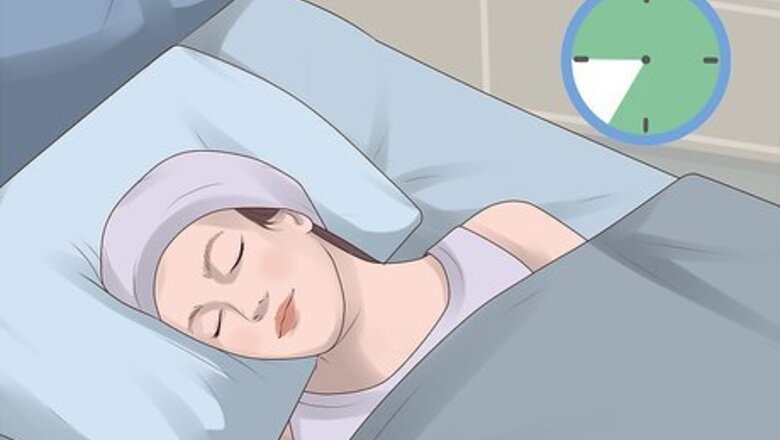
views
Planning Ahead
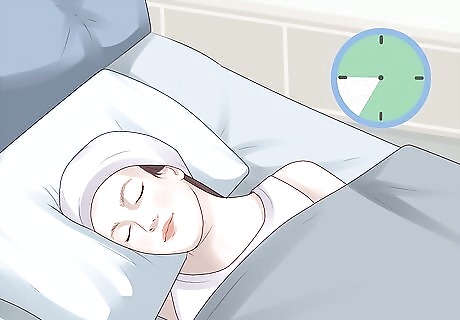
Get lots of rest the night before. It's much easier for the body to run on one night of no sleep than one night of no sleep and one night of bad sleep, so make a plan to sleep as much as you can the night before. Also make sure staying up all night doesn’t become a regular habit, as it could lead to serious health issues. Sleep in the night before. If you wake up around 8:00 or 9:00, you'll be less tired when it's time to start really staying up. Try not only waking up really late but going to bed a bit late the night before. If you go to bed at nine at night the night before, your body will start getting tired around that time. If you can, take an extended nap a few hours before you plan to stay up. This will give you an extra boost of rest and energy.
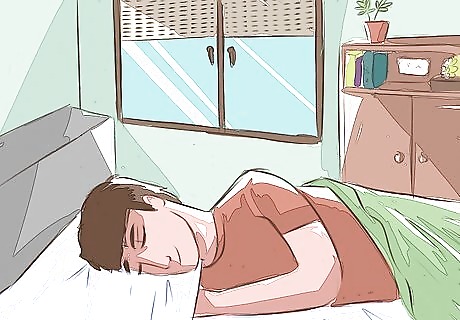
Try to take a short afternoon nap. This will allow you to have more energy during the night. If at all possible, make this a 20- to 30-minute nap and limit any potential distractions during this time. A longer nap may leave you feeling groggier and less alert afterward. Be sure to set a timer so that you don't oversleep! If you get really tired during your all-nighter, you can take a quick nap again, but for no longer than 20 minutes. If you take a longer nap, you might sleep until morning! Be sure to take out your contacts if you wear them, since leaving them in could harm your eyes and prevent proper sleep.

Eat well during the day. If you want to pull an all-nighter, you have to eat three healthy and balanced meals the day before you try to stay up, or your body will feel tired from unhealthy foods or fatigued from undernourishment. Here's what you should eat the day before: Have a big, healthy breakfast. Eat healthy carbs like oatmeal or wheat-based cereal, proteins like lean turkey or ham, and some fruits and vegetables. Add a yogurt or cottage cheese to your meal. Have a healthy lunch. Eat a sandwich with wheat bread, a hard-boiled egg, or a big salad with avocado, carrots, cucumbers, and tomatoes. Whatever you eat should give you a boost of energy without making you feel sluggish. Eat the right dinner for staying up all night. This will be the last meal you eat before you prepare to stay up all night, so make it count. Avoid greasy or fattening foods that will make you feel bloated or heavy. Instead, eat some chicken or turkey, couscous, whole grain pasta, fruits, and vegetables. Make sure you have some carbohydrates for energy, and some proteins like soy, chicken, or ham. Avoid heavily caffeinated or sugary foods. If you drink coffee all day or eat sugary snacks like candy, then you'll be crashing and ready for bed after dinner.
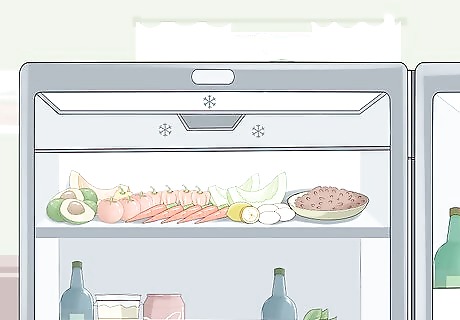
Stock up on healthy foods for the night. Prepare a kit of healthy snacks that you can eat if you get hungry throughout the night, and leave some healthy foods in your fridge if you know you'll be spending the night at home. Here are some foods you can stock up on as you prepare to stay up all night: Some healthy veggies. Carrot sticks and celery are a great snack that won't make you tired. You can even eat the celery with a bit of peanut butter. Some healthy fruits. Apples and bananas are easy to carry and will keep you energized. Some nuts. Almonds, walnuts, and cashews are a delicious and nutritious form of protein. If you're staying at home, make sure you have some chicken, tofu, or turkey in your fridge, as well as some healthy pasta or couscous that you can cook in a pinch.
Staying Awake and Alert
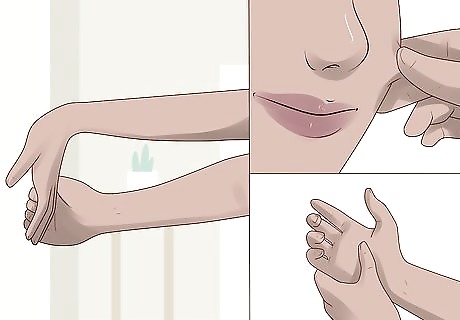
Stimulate your body. There are a few small tricks that you can do to stimulate your body and keep yourself alert throughout the night. You'll be less likely to fall asleep if parts of your body is active and engaged. Do a simple movement, like tapping your feet and stretching. If it becomes a habit, it might just save you from falling asleep during those final dire moments and it can keep you awake without being distracting. Stretch. Stretching your forearms, calves, and wrists will make your body feel more active and less tight. Roll your shoulders backward and forward and circle your head from side to side. Give yourself a quick hand massage. Tap your foot on the floor. If you're really falling asleep, pinch yourself or bite down on your tongue. Gently tug your earlobes. Chew gum or suck on a mint to keep your mouth active. If your eyes are getting tired, rest them out a window or gaze in a new location. Stimulate your senses. Turn up the bright lights and play some medium-loud music to jolt your senses awake. Try keeping music on in the background. If it has a good beat, you may find yourself naturally tapping your foot to the tempo.

Stimulate your mind. Keeping your mind alert is just as important as stimulating your body. To keep your mind alert, you have to switch tasks from time to time and to stay mentally engaged in whatever you're doing. Here's how to stimulate your mind: Pay attention. Notice everything that's going on around you, and ask questions if you don't understand something, like a section in your textbook that is unclear to you during a study session. Strike up a conversation. If you're in the middle of a cram session, it's easy to keep talking to the people around you. If you're at home and struggling to stay awake, call up a night owl friend or have a quick conversation with a friend online. Stay engaged. If you're watching a movie, ask yourself questions about it to make sure that you understand everything that's going on. Don't let yourself drift off. If you're watching television or having a conversation, make sure that you're focused on the task at hand instead of daydreaming.
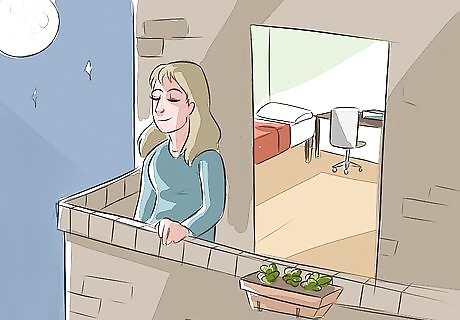
Take breaks. Avoid a decreasing sense of energy and motivation by setting a constant pace for yourself: for example, try 40 to 55 minutes of work, and taking a 5 to 20-minute break, or perhaps a quick walk around outside in a safe and well lit area. Looking repeatedly at a clock may distract you from your work. Taking breaks is especially important if you are working on the computer; it will help prevent headaches and eye strain.
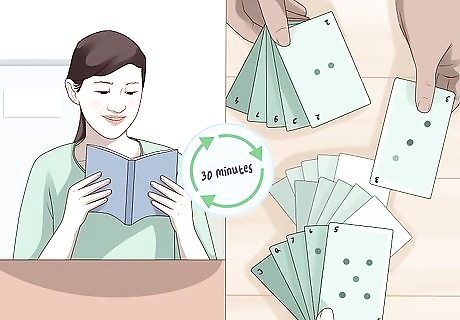
Switch it up. If you want to stay up all night, you have to be able to switch it up from time to time to keep things fresh and to keep your body from falling into a trance. There are a few changes you can make to help yourself stay up all night. Switch tasks every 30 minutes. If you're watching a movie at a sleepover, take a bathroom or snack break from time to time. If you're cramming for an exam, switch from studying your notes to using flashcards. Switch up your environment. If you can change your environment, it will be easier for you to stay stimulated. If you're cramming for an exam, move to a different part of the library or your dorm. If you're at a sleepover, just try getting everyone to hang out in a different room from time to time. Hang out in a different part of the same room. If you're nodding off at your friend's New Year's party, just move from the couch to the kitchen and keep talking to people. If you have to keep sitting down, pick a different seat.
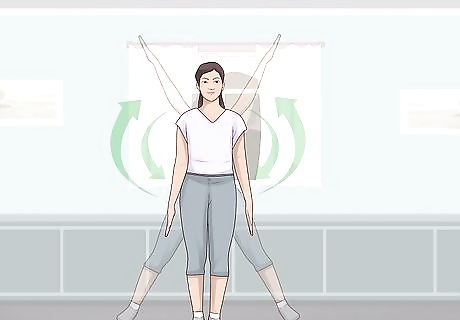
Get some light exercise. Though you'll only make yourself more tired if you start an intense workout as soon as you get tired, getting just ten minutes of light exercise can wake up your body and tell your mind, "Hey, it's not time to fall asleep yet." Here are a few things you can do: If you're at a party, take the stairs to the upstairs bathroom instead of using the one that's more conveniently located. Take a ten-minute walk outside or even inside to wake up your senses. If you're alone in your room, just do thirty jumping jacks or run in place for two minutes.

Drink some caffeine in a pinch. Though caffeine can make you crash and be even more tired than you were to begin with, if you're reaching those late hours of the night and your eyes feel like sandbags, if may be time to have some emergency caffeine. Start off with a cup of black tea. Its side-effects will be less intense than the effects of coffee. If you're already a big coffee drinker, have 2 or 3 cups. If you're really desperate, drink an energy drink like Mother, Monster or Red Bull.Warning! Try to avoid consuming more than 4 cans at the maximum! This will certainly give you a boost of energy for an hour or two, but the crash afterwards can be significant.
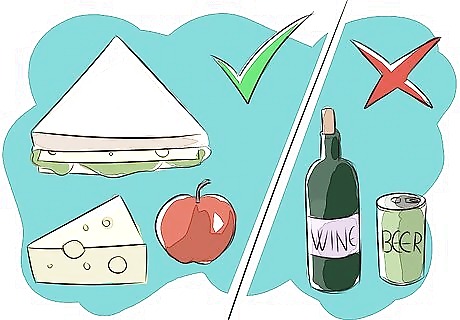
Eat protein-rich foods to stay energized. Foods like sandwiches, cheese, and other dairy products can allow you to feel more alert. Sugary foods may make you feel awake for a little while, but will eventually make you crash and feel drowsy. Apples keep your blood sugar stable so you're able to stay awake longer. Any fruit or healthy food is better than eating sugary foods. Avoid eating a heavy meal the evening of the all-nighter. This will leave you feeling lethargic and sleepy. Eat a light, healthy meal, such as a stir-fry. Avoid alcohol, as this depressant will make you sleepy. Try to have some kind of protein when it's time for breakfast, because protein is a good long-term source of fuel for your body.
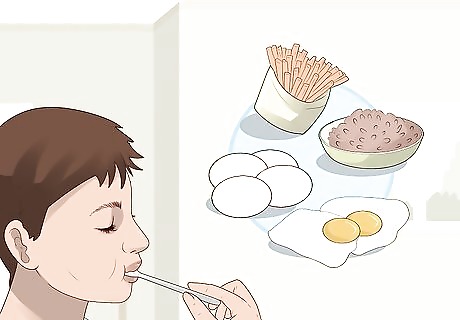
Make sure you are eating the right foods. When you're trying to stay up all night, you should eat just enough to maintain a healthy level of energy, but not so much that you feel bogged down and sluggish. If you've already eaten your three healthy meals, then you shouldn't be too hungry while you're staying up all night, but there are still a few foods that can help you stay awake if you're having a craving. Eat a hard-boiled egg or quickly make an egg sunny-side up if you're at home. Eat a handful of almonds, cashews, or pecans. Eat a crispy apple, celery, or carrot sticks. Just crunching into these foods will wake up your mouth and will make you more alert. Bananas are great for all-nighters because they keep you awake for longer than usual and give you a great source of Vitamin B1 and potassium. Have a piece of toast with a little bit of peanut butter. If you're craving a fourth meal, try to have a healthy carbohydrate like brown rice and protein like turkey. If you can't avoid ordering out, try picking foods that aren't too greasy or fatty.

Play hardcore metal music. You may not enjoy it, but harsh and arrhythmic music will keep your mind alert. Try to stick to instrumental music, which is less distracting. This will keep you from being lulled to sleep. If others are sleeping around you, clearly you'll need to keep the level of the music low. Use earphones if necessary.
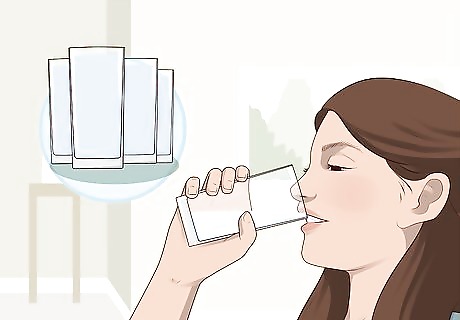
Drink lots of water. Staying hydrated can help you stay awake significantly. Drink a glass of ice water to shock your body awake, and drink water frequently to keep your body hydrated and to continue to feel refreshed. Drinking lots of water will make you have to go to the bathroom often. This can also help keep you from dozing off.
Staying Optimistic

Make sure that pulling an all nighter is unavoidable. You should not stay up all night just because you need to study; your sleep is the time when memories are properly processed. Denying yourself sleep can make your brain less effective at retaining information. In most cases, it is better to get at least a little bit of rest during the night rather than none at all. To remain healthy, never stay awake for 2 whole nights in a row. Pull an all nighter as infrequently as possible.

Think positively. Negativity will only slow your productivity, so assure yourself that you will be rewarded for your time and effort. Positive thoughts, on the other hand, will keep you motivated and prevent you from giving up too soon. Here are some examples: "I am almost done!" "This is actually not too hard." "I will get to see the sunrise." "I will get a good grade." If you’re studying all night and find some of the material boring, try to talk yourself into liking it by repeating something to yourself like, "This passage about DNA is fascinating." Don't underestimate your power to trick yourself.

Reward yourself for each accomplishment. For example, you can promise yourself a 15-minute break after you complete an assignment. During this break, you can eat your favorite snack and watch some TV, browse the internet, or play a game. Having rewards is like the carrot on the end of the stick; they will motivate you to keep going, despite your tiredness. Make sure that you set the rewards before you begin. This way, your mind will anticipate them.
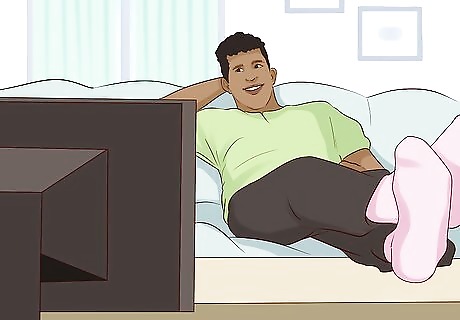
Plan some time the next day to give yourself a break so you can recharge. Pulling an all-nighter is tough on your body and mind. After you do the all-nighter, go to sleep. Then, at some point during the next day, give yourself another bit of time to just relax and recharge. This could be watching a movie or TV show, going for a walk, or something else you enjoy doing.
Improving Your Workspace and Limiting Distractions
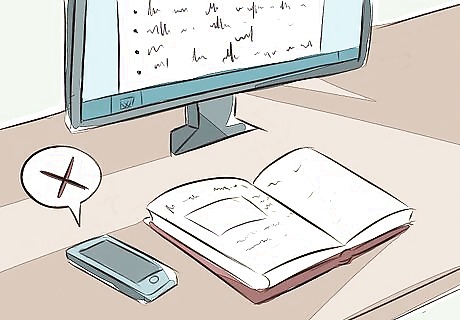
Turn off all of your devices. Distance yourself from your cell phone, the TV, and other electronics. Don't surf the internet, either. If the internet is still too distracting, turn off the Wifi and don't turn it back on until you've finished your work. Download an application that blocks distracting websites, such as SelfControl. You could set your cell phone to Airplane mode, rather than turning it completely off, so that any incoming messages will be blocked until switching it back into its normal mode.
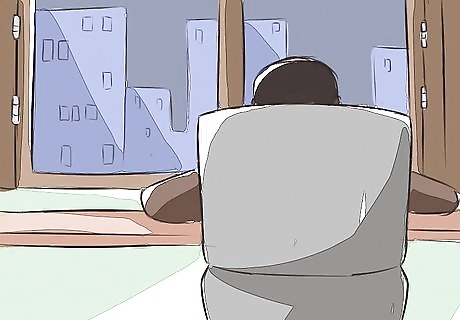
Work with the windows open. Cold air will help to keep you awake, while warm air will make it harder for you to stay awake. Think of the nights you can't sleep because of being cold compared to the nights when the cozy warmth of a room causes you to nod off. If you find the cold air is effective in keeping you awake, you can even go to the bathroom and splash your face with cold water. Not everyone improves their alertness in cold air. For some people, it works the other way around; warm air causes them to stay awake and the cold makes them fall asleep. Choose whatever works best for you.

Avoid working in comfortable places. Don't set up a workspace on your bed, on a couch, or on the floor. If you work in an environment or position that’s too comfortable, you will likely feel very tempted to sleep. If possible, work somewhere far away from your sleeping area or bed, so that it's an effort to try to go back and sleep. Try to be around people. Knowing that others may be watching you may motivate you from sleeping in your chair.
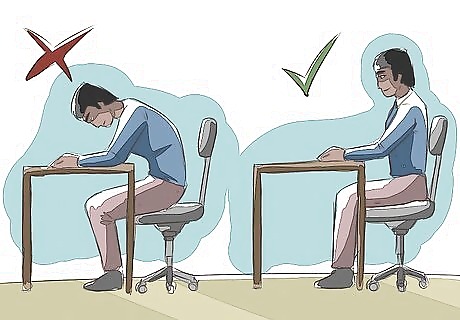
Maintain an upright posture. Be careful of slumping! When you're tired, slumping your body may become a natural habit. However, make yourself sit up straight. It may increase your state of alertness and help you to feel better. Try sitting in different places around the room.
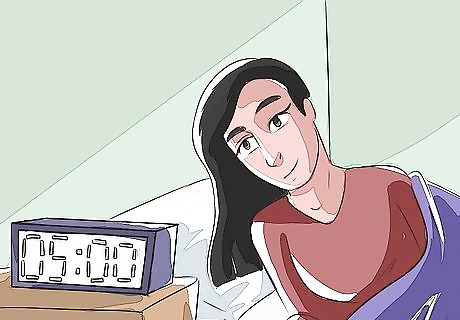
Acknowledge your limits. If you can't remember what you've just read or you're nodding off involuntarily, you need to listen to your body and go to sleep. Sometimes it's better to get 3 or 4 hours of sleep, rather than being in a complete daze the next day.
















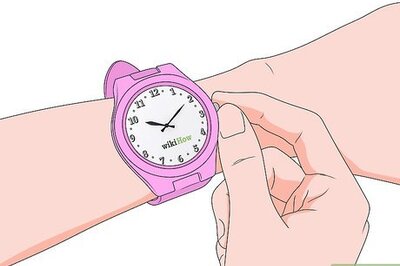

Comments
0 comment